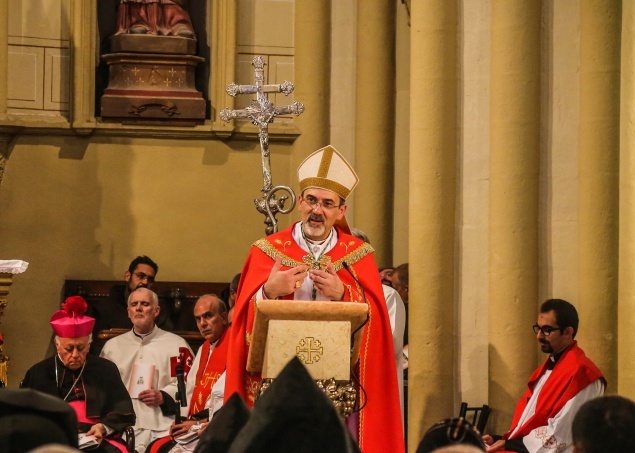Dear beloved,
Four years ago, at the conclusion of my mandate as Custos of the Holy Land, the Holy Father wanted to appoint me Apostolic Administrator of the Jerusalem Patriarchate of the Latins.
So I wanted to interpret that designation, which still does not cease to amaze and surprise me, in the light of the verb “to return”: like the disciples of Emmaus, ready to leave Jerusalem after the events of Easter, I too felt invited to return to Jerusalem, to resume the journey, rediscover the community, intensify the commitment. And, in fact, these were among you, years of recovery, of gathering, of intense commitment, not always easy, sometimes tiring. Together we tried to solve some problems of the Diocese, so that its testimony and its mission could be made more flexible and transparent.
And when I thought that my mandate in Jerusalem was over, I received a new invitation from Pope Francis who wants me to be Patriarch. And so I am asked this time to “stay”.
I cannot escape the suggestion and “weight” of this verb. It is the verb of mature patience, of watchful waiting, of daily and serious fidelity, not sentimental and fleeting. It is above all the Lord’s invitation to His Apostles before the Ascension: to them, still bewildered and perplexed, tempted to go their own way, or to resolve everything immediately, to almost force God’s times, Jesus tells them: “Stay in the city until you are clothed with power from on high” (Lk 24:49). And they remained, learning that the fulfillment of the Kingdom was not in their hands, that it comes from on high, invoked and awaited in the patience of faith and hope.
And so, I too remain, to walk among you and with you, in faith and hope, waiting for the Power that comes from on high. First of all, I would like to walk with priests, men and women religious, deacons and seminarians: with them I remain at the service of all, to witness and learn the primacy of God and His times, the patience of sowing, the waiting full of hope and certain of the fruits of the Spirit.
“To stay”, “to remain”, however, as in John’s Gospel, is also the verb of love, the true one, the one learned in the Upper Room and in Gethsemane. It is the most difficult meaning for me. In a time characterized more and more by evasion and escape, by speed and the search for ever stronger emotions, it almost seems an outdated, old, impossible invitation.
Indeed, old and new problems afflict us: narrow-minded politics and incapable of vision and courage, an increasingly fragmented and divided social life, an economy that is impoverishing us more and more, and lastly this pandemic, with the imposition of slow rhythms and contrary to the life we were used to. But I also think of our schools in ever greater difficulty, of our ecclesial communities that are sometimes so fragile and, in short, of the many problems inside and outside of us, which we already know. All this, however, is teaching us painfully but, I hope, effectively, that man’s steps and rhythms must be more if he wants to save himself and the world.
We must not be discouraged. In these four years I have experienced that, together with the many problems, we also have the resources, the desire and the strength to look forward with confidence, capable of living the ambiguity of this time with Christian hope.
And also for this reason I feel the invitation addressed also to me and to our Church to “remain” not so much in a place, but above all in a disposition of soul, in a vital availability: to remain faithful to the gift of Christ and of ourselves for the salvation of the world.
I know that difficult moments and complex choices await us, but I am sure that together we will be able to look to tomorrow with confidence, as it has been until now.
I, therefore, assure every one of my will to serve each one, our people and our Church, to love them as much as possible with that same love of the Upper Room and Gethsemane, placing at your disposal what I am and what I have. And I ask you to remain with me in the same availability, in the same decision.
The pallium, which will distinguish my new ministry in your midst in the most solemn moments, reminds us that we have chosen in Baptism to take upon us the yoke of Christ, the weight and glory of the Cross, which is love given to death and beyond.
The Spirit invites us to look to the future of God which will come “in not many days”, which is indeed among us. Let us then be guided by the Spirit in this new beginning for our beloved Jerusalem Church. And may our Patroness, the Queen of Palestine, intercede for us all.
I warmly embrace you and bless you in the name of the Lord.
+ Pierbattista Pizzaballa
Patriarch of Jerusalem for the Latins






